Samsung Droid Charge Review - Droid Goes LTE
by Brian Klug on June 22, 2011 7:47 AM EST- Posted in
- Smartphones
- Samsung
- LTE
- 4G
- Droid Charge
- Mobile
WiFi, Hotspot, Audio Quality, Speakerphone, GPS
The Charge is yet another smartphone to use Broadcom’s BCM4329 for Bluetooth 3.0 + EDR and 802.11b/g/n WiFi. Thus, it connects at 72 Mbps using one spatial stream on 2.4 GHz WiFi. Range is just what I’m used to seeing with the Charge, there’s nothing to report here that’s out of the ordinary, as the Charge hands on and off of WiFi predictably well just like every other BCM4329 based device.
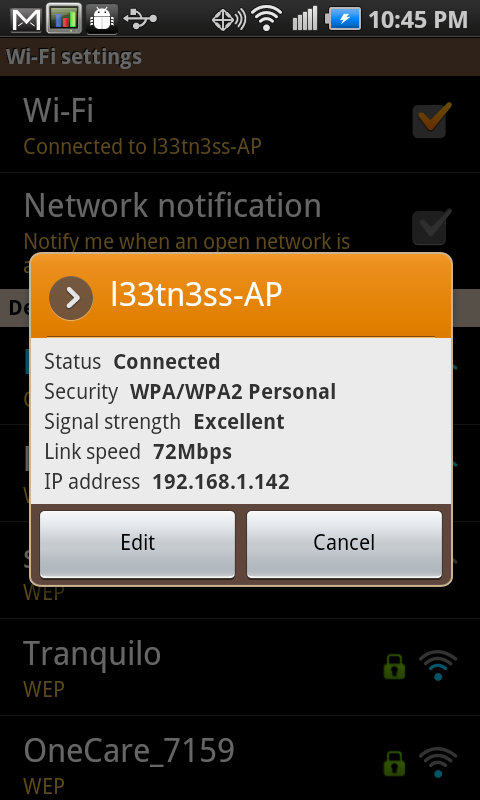
Likewise the Charge supports WiFi hotspot creation, though Samsung rolled its own software for the Charge and doesn’t use the native Android hotspot utility.
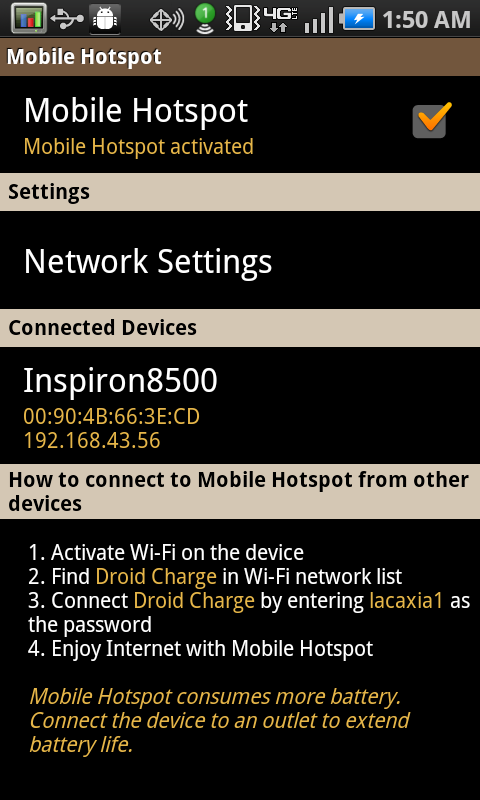
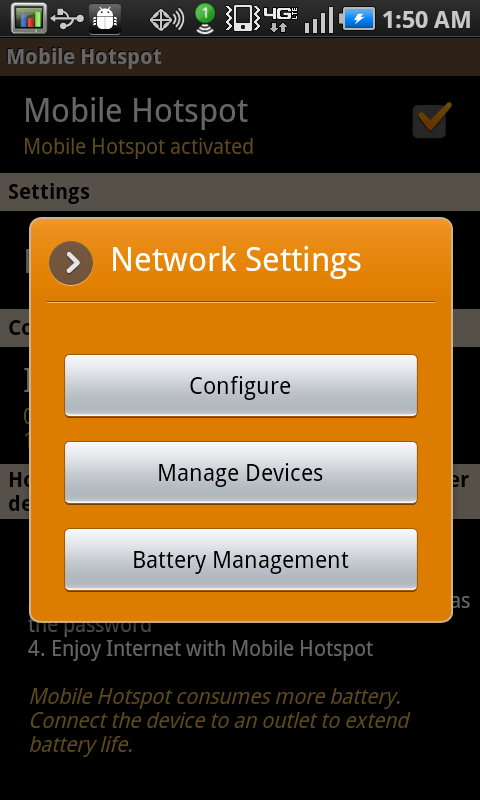
The Charge originally received a lot of press for being able to support 10 WiFi clients on 4G LTE and 5 on 3G EVDO, which has been free thus far. Hotspot functionality worked fine through the end of May, at which point it stopped working unless you manually set your date back inside May. After the EE4 update, functionality was restored, but I’ve encountered some problems of my own despite the free LTE hotspot creation period being extended.
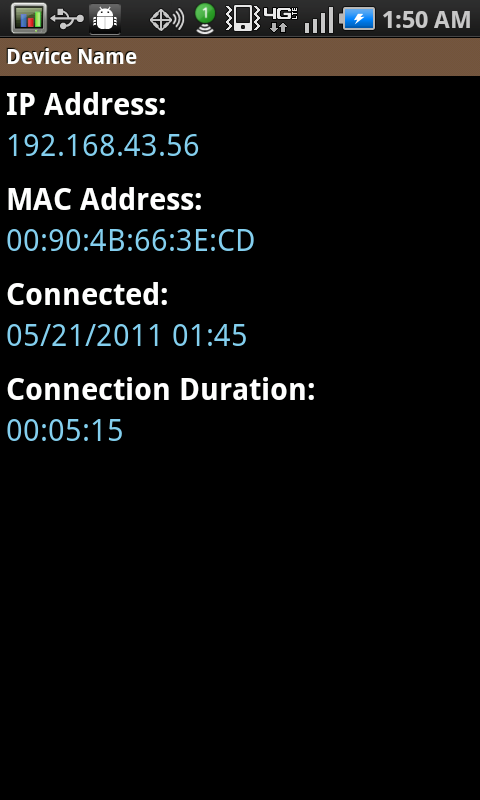
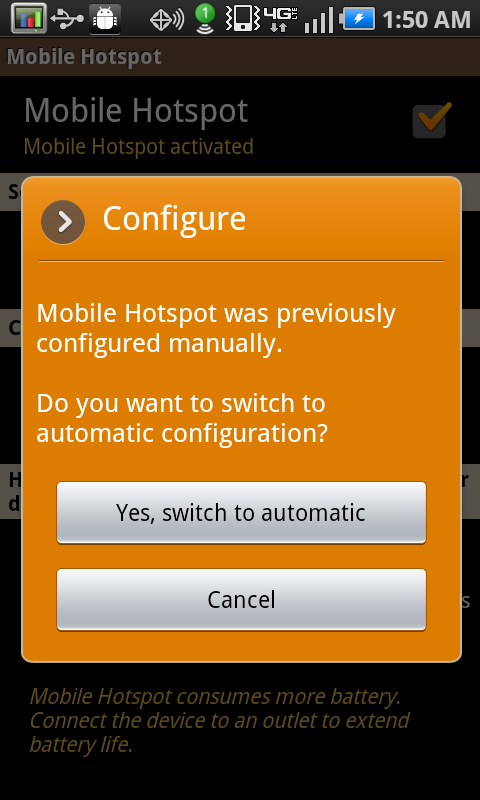
Though it’s a bit wonky, the Charge hotspot software is relatively standard fare and lets you do the usual things like set an SSID, WPA/WPA2 pre-shared key, timeout, and view details on individual connected clients. I didn’t get around to trying to have 10 devices connect, but I’m sure it would have worked. As an aside, it seems odd that Verizon’s 4G LTE handsets support more attached users than their dedicated portable hotspot products, and the latter come with tiered data. Something is very wrong with that picture.
I know that audio performance is another huge concern for many smartphone shoppers, and I’ve heard more than one request for some analysis going forward. We’re absolutely going to start doing so, for now however I can say that the Charge has the same Wolfson Microelectronics WM8994 multi-channel codec as Galaxy S. I listened to lots of Google Music tracks on the Charge using some Shure SE535s and the whole thing sounded great to me.
Samsung Droid Charge - 1x Voice by AnandTech
The other important voice quality metric is how actual calls sound. The Charge of course has a unique baseband, and thus I was initially curious to see how calls were going to turn out. I don’t remember ever thinking calls were bad sounding before the update, but after the update things sound excellent. I took a recording using the same method we used in the Thunderbolt to illustrate how good the Charge sounds - there’s no squealing or random drop-outs. I’m actually very impressed.
Next up is speakerphone volume which is another important metric. We measure using a digital Extech sound-level meter while calling that same number on speakerphone at maximum volume. The Charge is nice and loud here, and that extra loudness is especially useful for more than calls – it’s also nice to have when using Google Navigation.
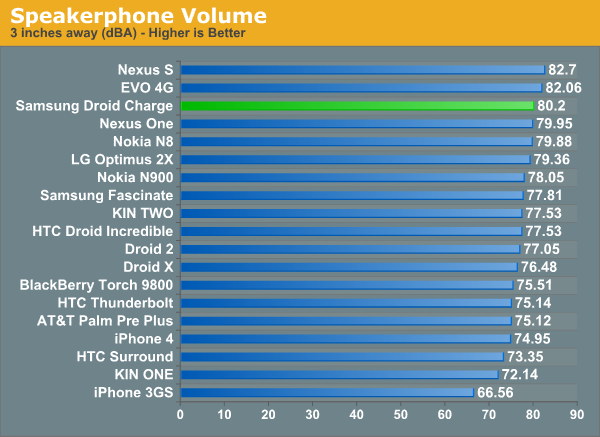
I guess that brings me to GPS performance. The original Galaxy S series had some big headline-grabbing GPS problems, and the Verizon variant seemed to never quite shake them either.
I tested anywhere between 4-10 seconds from complete reboot to a good GPS fix on the Charge’s GPS with WiFi turned off. This is a far cry from how broken GPS used to be with every other device. I used the Charge for Google Navigation and drove just north of 800 miles without GPS ever flaking out - trust me, this GPS is tested and passes. That said, that time to fix could still be a bit faster, and you do need a large swath of unobstructed sky for things to work nicely, but it isn’t anywhere near the flustercuck that was Galaxy S GPS.


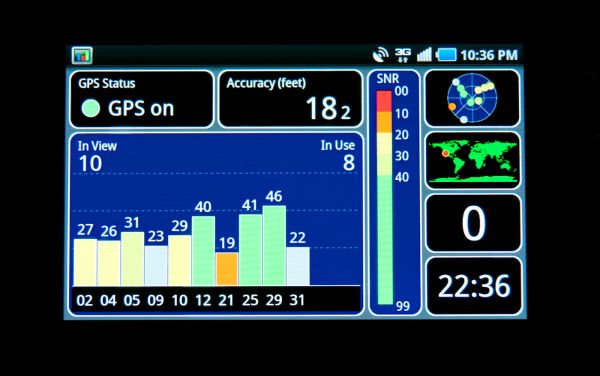








61 Comments
View All Comments
crydee - Wednesday, June 22, 2011 - link
Samsung never updates.. I still have the Galaxy first Android on AT&T and still no working GPS.sprockkets - Wednesday, June 22, 2011 - link
I saw the picture and thought this was a review of the new iphone! Oh my! Now I can see why apple is so angry!GFY JOBS!
spctm - Wednesday, June 22, 2011 - link
Not sure why it is so but I am running Cyanogenmod 7.1 nightly on a nexus one and I get these scores.SunSpider: 3354.2
BrowserMark: 54697
Linpack: 36.7 (Free Version)
Sunspider and Browsermark are way faster on cm-7.1, which is quite surprising as it is running Android 2.3.4 base. But Linpack is more along the lines with what Brian got. Not sure if the free version's ad streaming would have some impact on floating point operations of Linpack.
Just thought I would post this observations and see if others have similar results.
silverblue - Wednesday, June 22, 2011 - link
Looks to be a good phone, though I wonder if it'll be better than the Charge.Omid.M - Wednesday, June 22, 2011 - link
"I have an odd Sensation that the next one will be exciting..."Hah!
Can't wait for the Galaxy S 2 review. Hope it lives up to AT expectations.
@moids
name99 - Wednesday, June 22, 2011 - link
"My only complaint is that every once in a while, the LTE data session sometimes stalls briefly – sometimes for a a few seconds, other times for a few minutes. When that happens, you’ll see the uplink green arrow blink, but no orange downlink arrow. Rebooting the device fixes things.
"
Jesus Christ.
THIS is precisely why Apple has nothing to fear, as long as competitor vendors ship crap like this --- and reviewer web sites are so blinded by Apple hatred that they give them a pass. I mean, WTF --- a phone that you, randomly and frequently, have to reboot, and the reviewer thinks this is just par for the course?
This is 2011, not 1982. Forcing a reboot to fix random problems should be a strange and unusual situation, not a daily occurrence!
ThomasA - Wednesday, June 22, 2011 - link
Long time VZW customer, since GTE. This may change. The future should be interesting with the '4G' push, and now, the 'new' Verizon tiered data plans looming. Having a '4G' device will require either a big wallet or detailed restraint.I suggest using a cheap flip-phone for chit-chat and another device on hotspots (laptop, netbook, iPod touch) for web needs. Unless you enjoy transfusing the telecoms.
sitharien - Wednesday, June 22, 2011 - link
You are both correct, I was way mistaken. I look forward to Anand's review. I am holding off on any upgrade of my EVO 4G until I get a better picture of the Android battery landscape.BGK - Wednesday, June 22, 2011 - link
So what's the verdict on Charge vs Thunderbolt. If battery life is about the same, that leaves the screen as the Charge's major advantage.Also, do you think some of discrepancies in battery life in the reviews had to do with the reviews of the thunderbolt being done on older versions that may have been less efficient?
tdenton1138 - Thursday, June 23, 2011 - link
Visit XDA or Android Central forums. You can read up about both phone for people who use them every day... I love my Charge (every phone does seem to have its quirks) and don't imagine I'll bother upgrading for quite some time. Great screen, no lag (voodoo lagfix is needed here - why does Samsung use RFS filesystem when EXT4 is so much better?), acceptable battery, hackable. Until someone can demonstrate a real need for dual+ core on a phone (now tablets perhaps...?), I'm happily sitting out of the upgrade race for a while.